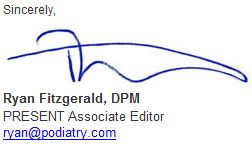| |
 Ryan Fitzgerald, DPM
Ryan Fitzgerald, DPM
PRESENT RI Associate Editor
Hess Orthopedics &
Sports Medicine
Harrisonburg, Virginia
|
The Best and Worst of Residency
hen I was originally asked to put together a piece which consisted of my "best" and "worst" residency experiences. At first, I believed that such an article would be an easy feat; certainly I have stories from each category that I could share (as I'm sure all of us do), but my stories are not unique. Each of us has experienced success and failure in dealing with our patients (and our colleagues) both in the operating room, and in the clinics, and I'm sure that each of you could share experiences and the lessons that you learned from them.
Instead of relating specific stories, I thought it might be more interesting, and perhaps ultimately more useful to us all, to consider the reasons behind my "best" and "worst" experiences—more than the specific experiences themselves—in an attempt to better understand the circumstances which lead to each experience. In that way, perhaps we all can manage to experience fewer "worst" days and many more "best" days.
 |
The Best Days
When considering the "best" and "worst" days of residency, the "best" days are easier to define. Success in residency is largely a function of preparation, and my experiences have been no exception.As one might expect, my most successful surgical experiences have always followed significant preparation. That each of us must adequately prepare to be successful is not a shocking statement—clearly this is a truth that we have all grasped. Otherwise, it is unlikely that we would have progressed this far in our training. In my experience, however, I've learned that it is not the initial preparation which is difficult, but rather the sustained effort, which poses a challenge. It is easy to be enthusiastic and prepared at the beginning of a rotation, but sustaining that level of intensity becomes increasingly difficult as the hours grow longer, stresses increase, and time becomes preciously inadequate. It is during these times that I have found myself in a struggle between wanting to prepare (like I know I should) and wanting to rest or to follow some other pursuit which, while interesting, will ultimately not progress my knowledge or skill. This is a daily struggle — one we all face — and each of us must find the motivation necessary to maintain our intensity and our focus to maximize our residency experiences.
 |
The Worst Days
However much one may hope for only "best" days, there are those times where the "worst" days seem to occur.
Such as been true for my life as well; for as many highs as I have experienced during my residency training, there have also been significant lows that have challenged me professionally and personally, and have ultimately shaped me into the physician that I have become. As I critically evaluate the circumstances behind my
"worst" days of residency, I have found several recurring themes which may offer some insight into those situations which haveultimately brought about my "worst" days in residency. Among these themes, poor attitudes and lack of communication, seem to be the key-stones on which everything else in these "worst" experiences seems to be built. My attitude, or a colleague's, or one of a patient's, has served to play a major part in creating situations that became the events which will remain with me for quite some time. Had there been a change in attitude, on my part, or on someone else's, my "worst"-day experiences might have been circumvented.
In addition to attitude, communication or rather the absence of communication, seems to have been the other major constant in my "worst" day experiences. It was a lack of communication, or a miscommunication, that most often lead to an escalation of events that ultimately created my "worst" residency experiences. Had those of us involved in these specific instances been able to communicate effectively, I strongly believe that many of these "worst" day experiences would have been averted. Communication is an absolute necessity and as resident physicians, we must communicate effectively both with one another, with our attendings, and with our patients. It is the breakdown of communication along any of these pathways that can lead one into a "worst" day experience, and therefore, it is vital that weaknesses in communication be addressed in the future, to hopefully avert other situations from reaching such perilous states.
We at PRESENT love hearing from you, and look forward to learning from you. I encourage you to post your interesting cases in the eTalk section of PRESENT podiatry to promote our collective knowledge. We look forward to hearing from you!

|